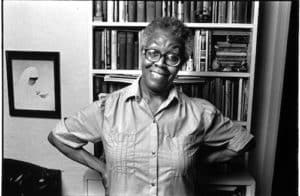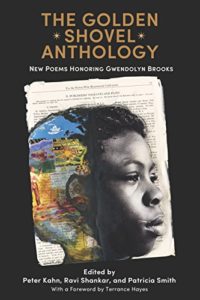If you’ve never heard of the Golden Shovel form of poetry, you’re not alone. It’s relatively new, created by National Book Award winner Terrance Hayes to honor Gwendolyn Brooks (1917-2000) in her centenary year. Brooks garnered a number of significant “firsts” in her life—the first African-American to win the Pulitzer Prize and the first black American to be Consultant in Poetry (poet laureate) to the Library of Congress.
The Golden Shovel poetic form is usually based on a line or verse from Brooks’ poetry—the last words of each line of a poem are the words taken from a line or verse of a Brooks poem. A Golden Shovel poem can literally be read in two ways—the standard way of reading a poem from left to right, and reading the last word of each line downward, to read the verse or line from Brooks. The poem doesn’t have to be about a Brooks poem or even the subject she was writing about, but it can be and often is. And so you can read a Golden Shovel poem as either direct homage to Brooks and her poetry or as an acknowledgment to her ongoing influence.

Gwendolyn Brooks
To recognize the centenary of Brooks’ birth, The University of Arkansas Press has published The Golden Shovel Anthology: New Poems Honoring Gwendolyn Brooks. Edited by poets Peter Kahn, Ravi Shankar, and Patricia Smith, the anthology includes more than 300 poems that use the Golden Shovel form. The book includes a foreword by Hayes and his own Golden Shovel contribution to honor Brooks.
Only a partial list of the participating poets is possible, but the contributors include some of the best known poets writing today: Andrew Motion, Billy Collins, Sharon Olds, Jacob Polley, Nikki Giovanni, Don Share (editor of Poetry Magazine), Rita Dove, Kim Addonizio, Edward Hirsch, and more. What I particularly like is that the anthology also includes poems by lesser-known and relatively unknown poets, demonstrating that Brooks is continuing to have an impact on poets of later generations.
The collection is arranged alphabetically by the titles of the Brooks poems selected. A number of writers selected the same poem for their Golden Shovel; 14 poets, for example, chose “We Real Cool,” one of Brooks’ best-known poems and the one whose subtitle contains the original reference to the “Golden Shovel.” Other poems have only one Golden Shovel contribution, like Addonizio’s poem based on Brooks’ “Queen of the Blues.”
Here is poet David Wagoner’s contribution, based on Brooks’ “Boy Breaking Glass.” I’ve boldfaced the last word of each line to highlight the line from Brooks.
That Boy Is Still Breaking Glass

but me, and nobody but me knew
what was on the other side or where
more light would be coming from till I
showed people where it was
and where it was going to be and,
look, that’s plain as day now.
You can come and watch because I
showed just how good I am
at opening eyes and ears, no
matter if nights seem longer
and darker for you out there.
The Golden Shovel Anthology is an extraordinarily fine way to honor Gwendolyn Brooks and her poetry. The form looks easier than it is to write. Some 300 poets made the effort because of who Brooks was and what she accomplished with her poetry.
Related:
Gwendolyn Brooks’ “Selected Poems
National Poetry Month (2010): Gwendolyn Brooks
National Poetry Month (2011): Gwendolyn Brooks
Terrance Hayes’ “Lighthead: Poems”
Photo by Twinfighter, Creative Commons, via Flickr. Post by Glynn Young, author of the novels Dancing Priest and A Light Shining, and Poetry at Work.
__________________________

“I require all our incoming poetry students—in the MFA I direct—to buy and read this book.”
—Jeanetta Calhoun Mish
- Longfellow’s “Paul Revere’s Ride”: Creating a National Legend - April 17, 2025
- Poets and Poems: Katie Kalisz and “Flu Season” - April 15, 2025
- Poets and Poems: Michelle Ortega and “When You Ask Me, Why Paris?” - April 10, 2025

Sandra Heska King says
I love this. And this form would be a good (challenging) poetry prompt, yes?
Glynn says
It’s challenging. It looks simple, but it’s really challenging.
Donna says
Oh wow, Glynn! This is fabulous! Thank you!
Bethany R. says
This new form is fascinating. What a beautiful way to honor Gwendolyn Brooks, now I want to go read some of her poetry.